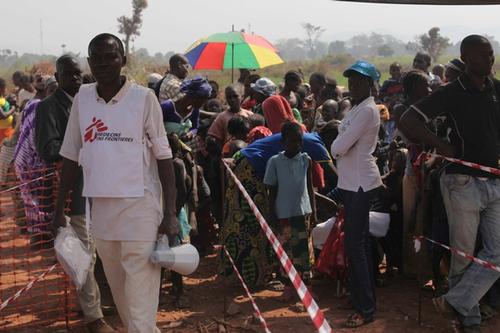Bangui, 8 January 2014 - Following confirmation of measles cases among children in several camps for internally displaced people in Bangui, Central African Republic, MSF is vaccinating 68,000 children in five camps in the city in order to prevent an outbreak. Hundreds of thousands of people are currently displaced in camps around Bangui as a result of violence since early December.
MSF has already vaccinated more than 25,000 children in the Don Bosco and Boy Rabe camps, and plans to have vaccinated 40,000 children in Mpoko camp and 3000 children in the Saint Michel and Saint Elime camps by Friday this week. All children between six months and 15 years are being targeted, which accounts for 40% of the total camp population. MSF also screens children that are under five years for malnutrition, and treats the severe cases. Complicated cases are referred to a specialised centre.
Highly contagious
“Measles can be a very deadly disease for children and is highly contagious,” said MSF’s vaccination coordinator Tessy Fautsch. “Ten to thirty percent of those children with already low natural immunity do not survive, unless they are vaccinated. As many of the children in the camps are weak and living in deplorable conditions, we absolutely want to prevent an epidemic, which is why we are carrying out these vaccinations.”
Measles is highly contagious and is easily and rapidly transmitted from one person to another through coughing, sneezing and close personal contact. The risks of transmission are therefore greater in overcrowded settings, such as the camps in Bangui.
Complications are common, and include severe respiratory infections (pneumonia), severe diarrhea and dehydration, and encephalitis (inflammation of the brain). Measles can also cause blindness and ear infections. Children, especially those that are malnourished, are most vulnerable to the disease.
MSF has been present in Central African Rebublic since 1997. MSF is currently managing seven regular projects (in Batangafo, Boguila, Carnot, Kabo, Ndéle, Paoua and Zémio) and four emergency projects (in Bangui, Bossangoa, Bouca and Bria). In addition, a mobile emergency team is covering the displaced camps of Bangui. MSF hopes to start activities in the hospitals of Bangassou and Ouango. In total, it provides free medical care through its work in seven hospitals, two medical centres and 40 health posts; and has more than 100 expatriate personnel and about 1,100 local staff in its teams.



